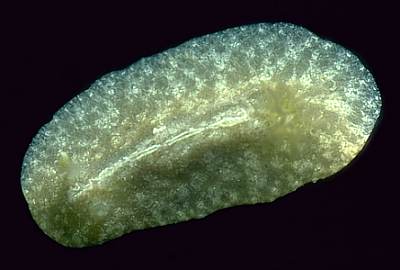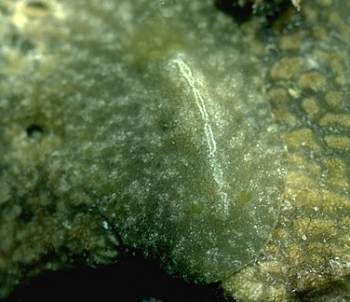

Asteronotus spongicolus
Gosliner & Valdes, 2002
Order: NUDIBRANCHIA
Suborder: DORIDINA
Superfamily: EUDORIDOIDEA
Family: Dorididae
DISTRIBUTION
Known from three localities in Tanzania, Zanzibar and north of Dar es Salaam, south to the Mtwara region near the Mozambique border, as well as from northern Queensland, Australia.
PHOTO
Lizard Is, North Queensland, Australia, 100m off Research Lab on patch reef, 3m, on Carteriospongia, 1 June 1979, AM C115954, 28 mm long alive. Lower photo shows animal on its food sponge, Carteriospongia. PHOTO: W.B.Rudman.
Animals elongate and ovoid in shape, 10-25 mm in length. Body yellowish green to brown with scattered, opaque white and dark brown to black spots on the notum. Notum may be entirely smooth or possess a few slightly elevated tubercles. A medial longitudinal line of lighter pigment extends from anterior of the rhinophores to the anterior edge of the branchial pocket. The rhinophores are perfoliate with 10 lamellae, have opaque white spots on the base and middle regions and an opaque white apex. Eight lobes are found along the margin of the rhinophoral sheaths where there is also a concentration of opaque white spots. The gill consists of 5-6 tripinnate branchial leaves, bearing many scattered, opaque white spots, and having the same colour as the body. Six distinct lobes are found in the gill pocket which also has a concentration of opaque white spots along its margin. The foot is broad and of similar colour to the body, with the anterior being bilabiate and notched. An elongate, digitiform oral tentacle is present on either side of the labial region and mouth. Found abundantly in 1-3m depth, on the under sides of Carteriospongia sp.
See also Asteronotus mimeticus.
Reference:
• Gosliner, T.M. & Valdes, A. (2002) Sponging off of Porifera: new species of cryptic dorid nudibranchs (Mollusca, Nudibranchia) from the tropical Indo-Pacific. Proceedings of the California Academy of Sciences 53(5): 51-61.
Rudman, W.B., 2003 (January 15) Asteronotus spongicolus Gosliner & Valdes, 2002. [In] Sea Slug Forum. Australian Museum, Sydney. Available from http://www.seaslugforum.net/factsheet/astespon
Related messages
-
Asteronotus spongicolus from Lizard Is, north Queensland
From: Bill Rudman, January 20, 2003
